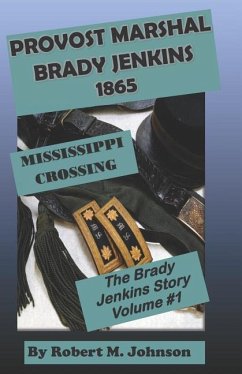The cannonade of Fort Sumter in South Carolina on April 12, 1861 brought to a head the American conflict that had been simmering and boiling over for nearly 100 years. The practice of slavery had become a commercial necessity to the southern colonies of the new American nation. South Carolina where Fort Sumter is located, had withdrew from the union of the United States just six months before the firing on Fort Sumter. The inevitable conflict had begun.It would be a bloodied, full-blown war in a country that had been at peace for over 30 years. By the spring of 1862, the Union army had enlisted 700,000 men and the Confederacy had armed over 300,000. The network of railroads spanning the southern colonies would play an important role in the way the war was fought and ultimately won by the northern armies. Lieutenant Brady Jenkins had graduated from the West Point Military College two years before the war began. Upon his graduation, he had quickly been enrolled in the military police. As a Provost Marshal, he would be responsible for any criminal activity exhibited by members of the Army or the United States Navy. With an army numbering only in the tens of thousands of soldiers, this responsibility of military policing, was a fairly manageable situation.There were no prisoners of war, and the military tribunals were all based in Washington DC. The Secretary of War, Edwin Stanton, was involved in dealing with nearly every major crime committed within the ranks of the military. Then the war broke out and everything changed. Over the next four years, Brady Jenkins saw his mandate change as his rank progressed. He quickly advanced to the rank of captain, in 1862. He received his Major's oak leaves the following year. Six months before the armistice at Appomattox, he was named Major General, at age 28. When General Lee and General Grant signed the document that ended the war, Brady Jenkins was there in the parlor of the MacLean house at Appomattox, Virginia. When President Abraham Lincoln visited the city of Richmond immediately after the conclusion of the war, Brady Jenkins was at his side. He walked with the President, conscious that every tree and every building might've held a sniper, an assassin, wanting to kill the man who had reduced the South to a failed sedition, and an empty shell of its previous prosperity.The fictional story of Brady Jenkins, begins on the fateful night of April 14, 1865, the night Abraham Lincoln was assassinated by the fanatic, John Wilkes Booth. Jenkins had been close to the president through all the trouble times of the war and had been part of his personal security guard when the Pinkerton agency was determined to be inadequate. This book, "Provost Marshal Brady Jenkins 1865," tells the story of how that fateful night in 1865 changed the life of the young Major General, and sent him on his journey to discover America.
Hinweis: Dieser Artikel kann nur an eine deutsche Lieferadresse ausgeliefert werden.
Hinweis: Dieser Artikel kann nur an eine deutsche Lieferadresse ausgeliefert werden.








